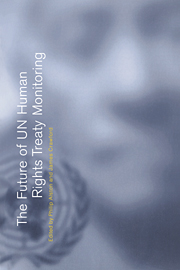Book contents
- Frontmatter
- Contents
- List of Tables, Figure, Appendices
- Notes on Contributors
- Editors' Preface
- Table of Treaties
- Table of Cases
- List of Abbreviations
- 1 The UN human rights treaty system: A system in crisis?
- A The UN human rights monitoring system in action
- B National influences and responses
- 9 Making human rights treaty obligations a reality: Working with new actors and partners
- 10 Domestic implementation of international human rights treaties: Nordic and Baltic experiences
- 11 The domestic impact of international human rights standards: The Japanese experience
- 12 The role of human rights treaty standards in domestic law: The Southern African experience
- 13 Uses and abuses of the treaty reporting procedure: Hong Kong between two systems
- 14 The United States and the international human rights treaty system: For export only?
- C Regional and sectoral comparisons
- D Common challenges for the treaty bodies
- E Looking to the future
- Index
9 - Making human rights treaty obligations a reality: Working with new actors and partners
Published online by Cambridge University Press: 23 December 2009
- Frontmatter
- Contents
- List of Tables, Figure, Appendices
- Notes on Contributors
- Editors' Preface
- Table of Treaties
- Table of Cases
- List of Abbreviations
- 1 The UN human rights treaty system: A system in crisis?
- A The UN human rights monitoring system in action
- B National influences and responses
- 9 Making human rights treaty obligations a reality: Working with new actors and partners
- 10 Domestic implementation of international human rights treaties: Nordic and Baltic experiences
- 11 The domestic impact of international human rights standards: The Japanese experience
- 12 The role of human rights treaty standards in domestic law: The Southern African experience
- 13 Uses and abuses of the treaty reporting procedure: Hong Kong between two systems
- 14 The United States and the international human rights treaty system: For export only?
- C Regional and sectoral comparisons
- D Common challenges for the treaty bodies
- E Looking to the future
- Index
Summary
Introduction
This chapter takes, as its fundamental premise, the view that implementation of and compliance with international human rights treaties are ultimately national issues – a reality which is often lost on those of us working at the international level. International and even regional human rights mechanisms are simply inaccessible to the vast majority of the world's population. At the end of the day, individual rights and freedoms will be protected or violated because of what exists or what is lacking within a given state or society, and not because of what is said or done within the United Nations Palais des Nations in Geneva. The ability of a state to discharge its responsibilities in the area of human rights effectively will depend predominantly on the strength of its domestic institutions. It is for this very simple reason that the worth of the United Nations human rights treaty system can best be measured by reference to its ability to encourage and cultivate national implementation of, and compliance with, international human rights standards. This is the only valid test of that system's relevance and effectiveness.
It follows that the work of the treaty bodies themselves should be heavily weighted towards encouraging and facilitating the development of national systems and processes which support and defend protected rights. The identification of those domestic mechanisms which play a critical role in ensuring (and in obstructing) compliance with human rights treaty obligations should not be especially difficult or controversial. Human rights are best protected in societies governed by the rule of law and by a representative, accountable government.
- Type
- Chapter
- Information
- The Future of UN Human Rights Treaty Monitoring , pp. 201 - 228Publisher: Cambridge University PressPrint publication year: 2000
- 7
- Cited by



